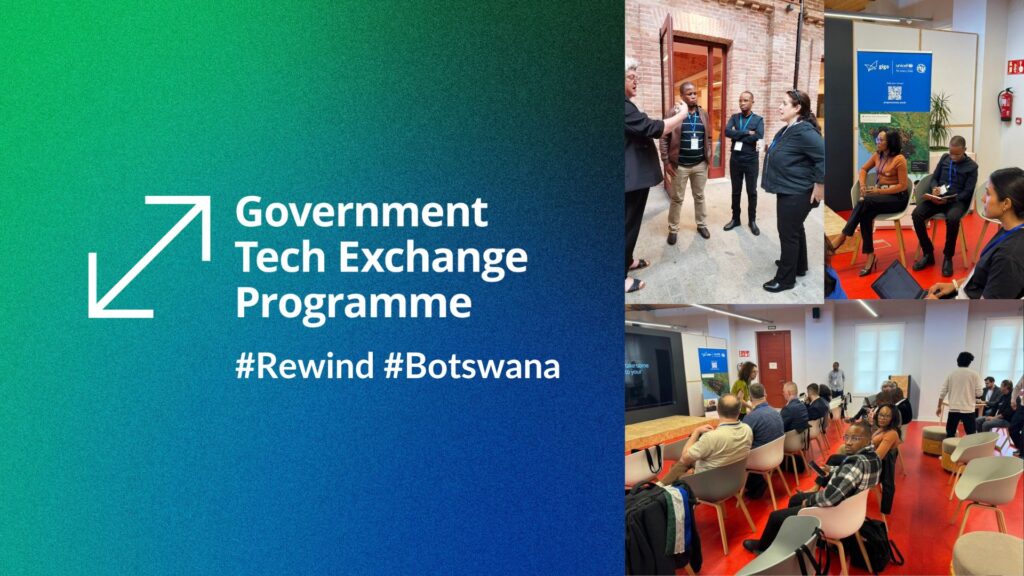In this special conversation, our Giga Botswana Programme Officer, Kudzani Nthekela, caught up with IT Principal Technical Officer Boitshwarelo V. Golekanye, and IT Technical Officer Moatlhodi Anderson Modikele - two Giga supporters from the Department of ICT and Media Services (ICTMS), of Botswana’s Ministry of Education and Skills Development (MESD).
Also known as Boi and Andy, both officers were part of the first cohort of the Government Technology Exchange Programme (GTEP), held at the Giga Technology Centre in Barcelona, Spain. Joined by delegates from Sierra Leone and Bosnia & Herzegovina, the programme was the first of its kind for Giga. Catch the moments we shared during GTEP here, as well as some lessons learned.
In this conversation, Kudzani, Boi, and Andy talk about how GTEP has impacted their work, the connections they’ve maintained, and their advice for the next batch of participants. Let’s dive in!
Kudzani: Great to have you, Boi and Andy. Last May, we met each other during the pilot run of Giga’s Government Technology Exchange Programme (GTEP) in Barcelona. Almost half a year since then, we’re curious to know how the programme has made an impact on your areas of work. How have GTEP and Giga’s tools improved your workflow?
Andy: Thanks, Kudzani. GTEP was a real eye-opener! It showed us that solutions to tech challenges can be broader than we imagine, both locally and globally. Since the programme, our collaboration with high-level departments, like the education directorate, has improved. We can now provide monthly reports on school connectivity, covering data like the number of connected schools, internet speeds, and ISP performance. Giga’s tools have made it easier to monitor connectivity data, identify latency issues, and track schools that need additional support—all from one platform!
Boi: I agree with Andy. GTEP and Giga’s tools have definitely improved our workflow. Now, the Ministry has a reliable tool to track school connectivity across the country. Giga Maps, for example, gives us a detailed map of school locations—something we didn’t have before. It’s helped us manage data more effectively and ensure our efforts are targeted where they’re needed most.
Kudzani: Great to know. And during the week, we saw how participants engaged with Giga’s tech tools, and the people who built them. And speaking of connections with the Giga team and other country colleagues – do you still keep in touch with colleagues you met during the program?
Andy: Yes, I’ve kept in touch with the Giga development team, particularly when we needed support with Superset and Giga Maps. They’ve been very helpful, offering virtual meetings and troubleshooting with a lot of enthusiasm. It’s reassuring to have that kind of support network.
Boi: Absolutely! During the programme, we realized that Botswana was ahead of some other countries in terms of installing real-time monitoring in schools. Most of them were still mapping connectivity while we had already begun installations. Our discussions often focus on how we manage school installations, especially since we’ve involved teachers to help set up real-time monitoring tools in their schools. It’s a learning experience for both sides.
Kudzani: I’m glad that the Programme has been useful, even up to now. This month, we’ll be welcoming our second cohort – what advice do you have for the next batch of participants?
Andy: “Go in with an open mind! GTEP exposes you to a lot of new technology solutions, and it’s the perfect opportunity to share your connectivity challenges and successes with the peers that you’ll meet there.”
Boi: “Be ready to learn and embrace new ideas. Keep an open mind, and you’ll gain a lot from the experience!”
Kudzani: Thank you Andy and Boi, it’s been a pleasure connecting with you!
=====
The second edition of Giga’s Government Technology Exchange Programme happens this week at the Giga Technology Centre in Barcelona. Stay connected with us on our social media channels to receive updates from our delegates from Brazil, Honduras, OECS, Panama, and Uruguay!

